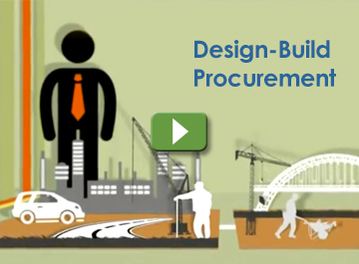January 17, 2014
Innovation of the Month: Design-Build
The design-build project delivery method combines the design and construction phases of a highway project in one contract. Highway agencies typically choose the approach to accelerate project completion, but it also provides potential cost savings without sacrificing quality.
When used on appropriate projects, design-build contracting offers several benefits:
- It reduces schedule delays. In traditional design-bid-build contracting, the design, bidding and construction phases are done in sequential order, which can lead to project delays. With design-build, some design and construction activities can overlap.
- It provides a single point of responsibility for the majority of a project’s development. Design-build can reduce the project owner’s administrative burdens by eliminating the need to coordinate between separate design and construction entities. Design and construction teams can address issues such as scheduling up front, which can lead to more efficient construction and lower costs.
- It promotes innovation. The approach takes advantage of designers’ and builders’ separate strengths, allowing them to use new design and construction techniques as needed. Innovations can be included in the selection phase to provide a competitive advantage in proposals or in the project implementation phase to cut costs or speed construction.

The Federal-Aid Essentials video below outlines the design-build procurement process. See Video »
FHWA Seeks EDC-3 Candidates
Got an idea for an innovative technology or process for FHWA to promote during the third round of the Every Day Counts initiative? The Center for Accelerating Innovation wants to hear from you. FHWA is seeking information on innovations that have the potential to transform the way the transportation community does business by shortening project delivery time, enhancing roadway safety and protecting the environment.
Florida Approves Alternatives for I-4 Project
The Florida Department of Transportation received a record 188 alternative technical concepts for the I-4 Ultimate design-build project in Orlando. The $2.2 billion project will add tolled express and general lanes and improve interchanges on 21 miles of I-4 throughout the metropolitan area. Benefits include congestion relief and safety. The concession agreement for the project is expected to include six years of construction and 35 years of operations and maintenance. After meeting with the four short-listed teams, the state’s ATC team approved 104 ATCs for the project. Next steps include federal authorization of the project, approval of a concessionaire and a proposal with ATCs and notice to proceed all expected to happen later this year.
Safety Innovations Help Iowa Cut Traffic Deaths
Preliminary figures show that 318 people died on Iowa’s roadways in 2013, the lowest fatality count since 1943 and the fifth straight year fatalities have been under 400. Iowa’s success points to the effects of increased seatbelt use, high-visibility enforcement, improved vehicle and roadway designs, and drivers making good choices. Among the roadway improvements were use of the Safety Edge on resurfacing projects and high-friction surface treatments. Other improvements include increased mileage of paved shoulders and installation of rumble strips on primary highways and high-tension cable median barriers on interstates.
Kansas Chooses Design-Build Team for Gateway Project
The Kansas Department of Transportation has selected Gateway Interchange Constructors to complete the phase two design-build portion of the Johnson County Gateway interchange project. This $288 million project will reconstruct the I-435/I-35/K-10 interchange, one of the state’s most congested interchanges. One of the largest projects the Kansas DOT has ever funded, it’s also the agency’s first experience with the design-build project delivery method. Construction is expected to begin in spring 2014.
Rhode Island Signs Grant Agreement
The Rhode Island Department of Transportation and FHWA have executed a TIGER V grant agreement for the Apponaug Circulator Long-Term Improvements Project. The project, located in a congested commercial corridor, consists of five roundabouts as well as pedestrian and bicycle improvements. The project is expected to start construction in June 2014 and be open to traffic in late 2017. The $34.1 million project cost includes TIGER V grant funding of $10 million.
Sioux Falls Installs Adaptive Signal Control Technology
The city of Sioux Falls, S.D., installed a new adaptive signal control system at 10 intersections on East 26th Street from Van Eps Avenue to Highline Avenue. The technology combines real-time traffic detection with real-time signal changes. As a result, drivers often experience shorter travel times and fewer stops. This system also has been proven to reduce fuel use and vehicle emissions and improve safety. A Sioux Falls Web page explains the new system to the public.


